#kingdom of Zeal
Photo

Luckily I managed to finish this before my wrist got busted. Valentine’s piece I guess? XD
I like to imagine an after the final battle where Magus finally takes (Dark)Glenn to see the home he’d been talking about all these years (or what’s left of it).
#chrono trigger#chrono trigger au#janus of guardia#glenn#magus#janus#kingdom of zeal#my art#artofmamon#darksideofthemamon#magusxglenn#maglenn
16 notes
·
View notes
Text
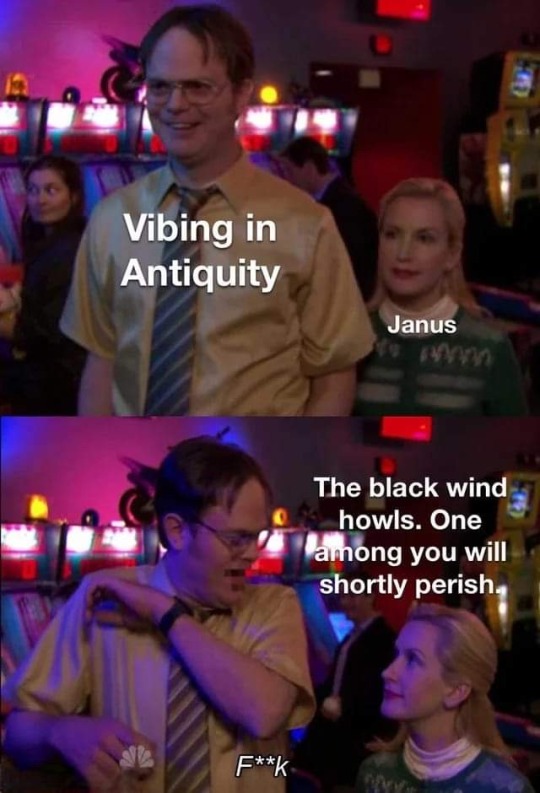
(Saw this in Discord)
53 notes
·
View notes
Text
Once upon a time there was a kingdom in the clouds.
The kingdom was ruled by wise monarchs for generations. They supported learning above all, and it was the most prosperous nation in all of history, in either direction.
The monarchs encouraged the kingdom's scholars, who made wonderful discoveries. They took care of the people of the planet below, who did not have the same gifts as those in the sky. And they hoped for an even greater future for all the people of the world.
In time, the hopes of the people in the sky became dreams, and they studied the dreams more than anything. Their crafters and smiths continued to create greater and greater wonders using discoveries found in the kingdom's dreams. And it was in these dreams that the first inkling that a power greater than even the sun was within reach.
The King of the kingdom in the clouds passed away, and his wife, a kind and powerful woman, took the throne. Her dreams revealed that the power was in the ocean far below her kingdom. She set her crafters to make their greatest wonder yet: a palace beneath the waves.
Dreams became reality.
Reality became a nightmare.
The people of the planet were forgotten or worse, and few people from the kingdom in the clouds thought to help them anymore. The people who worked on the palace beneath the waves became monstrous, forgetting who they were. The Queen harmed her people and her planet and her own children in pursuit of the new power. She became cold. Lost to her dreams. Lost to her own zeal.
The Princess was frightened of the woman her mother had become and fell into her own darkness. The Prince attempted to fix his broken family, but he was too late.
When the palace beneath the waves was completed, the Queen set out to take the power herself. She came face to face with a beast that fell from the stars, and had been slumbering under the center of the world for uncounted eons.
It awoke.
With a cry that shattered the heavens, the beast let forth an eruption of malice, furious at being disturbed. It destroyed the kingdom in the clouds, all of its history and achievements and dreams. The survivors were left without their homes and without their gifts. The people of the planet took them in and taught them their ways.
In time, the kingdom in the clouds was forgotten. The beast went back to sleep and slumbered under the center of the world once more.

9 notes
·
View notes
Text
What gets me about GW defenders saying that "Claude siding with Edelgard shows how far he's willing to go to get what he wants, he'll use anyone to further his goals" is that, even if that were accurate to his character... that's not what he does in GW. At all.
Which one of Claude's goals are ever progressed once he sides with Edelgard? And how does siding with Edelgard, specifically, accomplish said goal?
Maybe... killing Rhea? But all of the reasons he says he wants her gone in this game are either completely unproven or blatantly incorrect - there's no proof of the Church forcing arranged marriages, Crests do not force obligations onto those that have them (which Claude himself literally proves), and the Church is helping Dimitri restore Duscur - a foreign nation - meaning they are actively willing to help fulfill Claude's main goal that he came to the officer's academy to achieve.
And... that's it! That is the only possible thing that even POTENTIALLY helps Claude's dreams, and taking a five-second look at it shows that it actually does nothing at all to help anything. But in the meantime? Claude weakens Faerghus through agitating Sreng and invading it himself, forcing Dimitri to fight a three front war; he actively helps Edelgard get herself out of a messy situation, even though not helping her and letting her die would have actually helped him and would have actually been him using her like people keep saying he's trying to do; he and Holst even admit that by the end of the war Edelgard is going to make a vassal state of Leicester after taking the lion's share of Faerghus' territory for themselves, which Leicester can't do anything about because of Adrestia's far stronger military. He is the one saying that! He is the one pointing out that that is going to happen! And yet he just keeps going anyway!
He is the one getting used. Very blatantly, and very extensively. Claude walked himself into a trap and lied to himself into thinking he's the one with the upper hand, which somehow managed to convince a large portion of the fanbase too. There's no gray morality here, there's no cunning being showcased, Claude is just an evil stupid tool
#clyde discourse#doing a read over for what i have for the GW rewrite and just. man.#like. it's hard to even like Clyde as a villain because he is just so incomprehensively incompetent in literally everything he does#once Part 2 hits#like imagine if he helped EdeckyWecky up to the point where she'd ACTUALLY die without his help... and he doesn't give it#he lets her die and lets the Empire crumble without leadership#but Dimitri can't take advantage of that because he still has to deal with Sreng and the Alliance#meanwhile Clyde is sneaking in more and more Almyran forces through Nader manipulating Mr. King of Almyra#until he has enough to take on the weakened Kingdom and force it under submission through the constant pressure he's forcing it under#not through brute force but just through wearing them down to the point where they just can't keep going#and in his zeal to conquer Fodlan he fails to recognize that he's just become Shahid; someone who wants to become king no matter the cost#like imagine it's never said outright but that THIS is how power corrupts once genuinely good people#they're so focused on getting to the end point that they gradually care less and less about how red their path to that end point is#until oops everyone is either dead; too scared/unable to fight back; or are also swept up in the mindset of By Any Means Necessary#THAT'D BE A NEAT VILLAIN. even if it's not *Claude* at all that is a villain i could get behind!#but people keep insisting that 1) Clyde isn't a villain (he is) that 2) he's doing the right thing (he's not)#and that 3) he's in any way compelling (he's just brown Eddy Geddy but stupid)
78 notes
·
View notes
Text
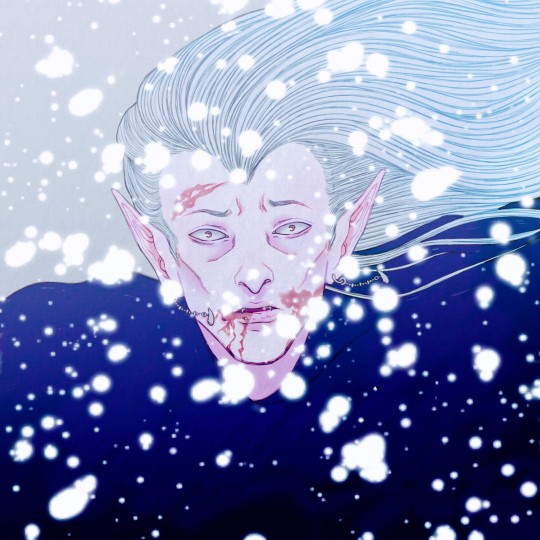
I'm...
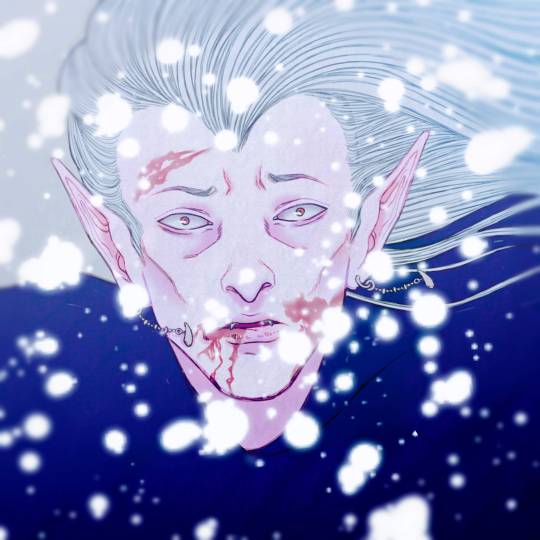
I'm back.
HELLO FELLOW CHRONO TRIGGER ENTHUSIASTICS, IT'S BEEN A WHILE
Magus isn't the only one to be back it appears.
This ain't much but it's honest work xD I'm planning to be more active here ! I missed the Chrono Trigger fandom (Even tho we're still mostly dead :') )
Well, be prepared to see a lot of Gorillaz stuff too (Sorry not sorry, new album, I'm sure you get it)
Anyway, this is a little fanart of Magus, when he got back to Zeal for the first time just after the party kicked his ass in 600AD. I actually have this drawing in mind since 2016, and this is far from the best thing I ever did, but hey, I still like it, it's all that matters.
I hope you do too ! See you all soon :D
(I want to do some fanart of the @janusofguardia AU so bad, this drawing gave me so much motivation)
#magus chrono trigger#chrono trigger#chrono trigger fanart#magus#zeal#zeal kingdom#fanart#video game#jrpg#video game fanart#digital art#art#drawing#square enix
19 notes
·
View notes
Text
SCHALA -> KINGDOM OF ZEAL
The Kingdom of Zeal was a thriving magic-based Kingdom thousands of years ago. Built atop an archipelago of floating islands, the kingdom carried harsh prejudice against anyone who was not born with the innate ability to perform magic, going so far as to banish non-magic users to the surface below. Magic-users living on the floating islands called themselves Enlightened Ones.
An unquenchable thirst for knowledge was the driving force for the Enlightened Ones. Most members of the society put a heavy stake in intellectual pursuits, including arts and technology, but with a particular focus on magic above all else. Knowledge, and especially magic, was power.
And none were more magical or more powerful than the royal family. Towards the end of the Kingdom of Zeal's era, Queen Zeal (the latest in a long line of matriarchs) became drunk with power, seeking relentlessly for a source of immortality. When a mysterious stranger came and successfully predicted the events of the following few days, Zeal began to lock herself away from those she once trusted. Her life became increasingly insulated until even the children she had once been so warm to barely recognized her.
Events took a turn for the tragic when her three most trusted advisors disappeared, leaving only the mysterious diviner to guide Queen Zeal down her path of ruin. Zeal summoned a terrible creature known as Lavos, with the belief she could leash it and siphon power from it to fuel her eternal life. Instead, Lavos pulled the Kingdom out of the sky and to the bottom of the ocean, destroying it. The royal children and advisors disappeared in the wreckage, and the Kingdom's people lost their access to magic and became indistinguishable from the surface-dwellers they had banished.
#hc. || tbt. (schala)#//not really a hc so much as background on the kingdom#//and its destruction#//aaaand how awful zeal herself (and zeal the kingdom) is#//for the folks who haven't played (which i assume is most folks)
0 notes
Text
Vicarious Faith
Saturday’s Column: Learning From Lehman
David Chang
Joshua, at the end of his life in Joshua chapter 24, summons all the tribes of Israel and their leaders to Shechem. He reminds them of their journey as a nation so far, what all God has done for them since the days of their forefathers, and everything God has done for them from Egypt until that present moment. Starting in verse 14, Joshua…
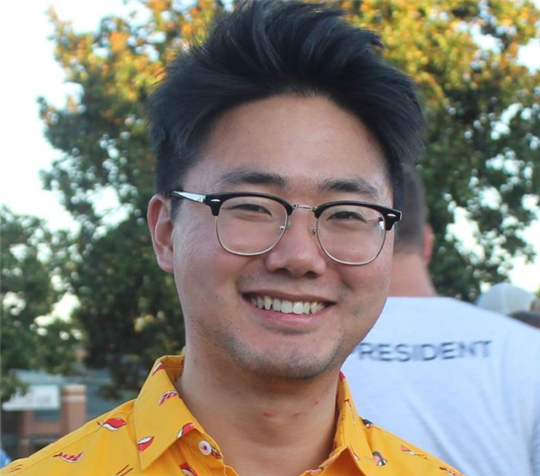
View On WordPress
1 note
·
View note
Text
Kaz Isn't Actually Motivated By Greed
Or at least, not primarily. Don't get me wrong, his stated primary driving factor is getting the money he was promised from Van Eck, but his reasoning isn't actually greed-based. Kaz's desire for money is goal-oriented and his fixation on it during the duology is fairness-based. He initially wants his share of the money because it will allow him to split from Per Haskell and start his revenge scheme over Pekka. He then pursues getting it with such zeal because Van Eck broke their deal and Kaz (rightly) feels cheated; Van Eck contracted him for a job, which he successfully completed, and then refused to pay him for it.
He fixates on destroying Van Eck because like Pekka Rollins, he broke his deal with Kaz and scammed him out of his money. It's the scamming and deal-breaking (and his inability to figure it out beforehand) that hit Kaz's pride and motivate him. If it were really just about the money, he could have gotten it any number of ways. But despite talking a big game about worshipping money and it being his primary motivating factor, he throws away an awful lot of opportunities to get and keep it during the duology:
He doesn't take the Ice Court job until he's shown the effects of parem and promised 30 million kruge (enough that when split he could realize his dreams of splitting from Haskell and taking out Rollins)
He gives up his shares in the Crow Club and Fifth Harbor to Pekka in order to rescue Inej and kickstart the Sugar Silo scheme
He doesn't abandon Inej after she's taken by Van Eck and sell Kuwei to the highest bidder, even though that would have been the most logical and lucrative option (as both Inej and Matthias think about)
He liquidates all of his existing financial assets to free Inej AND tells her where his emergency stash is so she and the rest of the Crows can get out of the city safely
He gives Rotty and Specht Per Haskell's share of the Ice Court Heist money (recognizing their loyalty and help) and Nina Matthias's share (to somewhat compensate her for her grief and honor Matthias's contributions) instead of keeping it for himself
He buys Inej a ship with part of HIS share of the money
And while several of the things he abandons money for are for Inej, to keep her safe and free and happy, the rest of the Crows and the Dregs at large benefit too. So do people he's probably never met. Pre-canon!Kaz fixed up the Slat with his own money so it's a safe-ish place for the Dregs to live, for example, and in Crooked Kingdom he totally goes along with Nina's plan to get all of Ketterdam's Grisha onto the boat to Ravka after a mostly token protest even though it massively complicates his plans.
It's pretty clear that no matter what he says, at the end of the day Kaz values loyalty, fairness, and keeping his promises more than he values money. The money is just a means to an end for him: he wants it because it will a) allow him to have an amount of safety and security for himself and the people he cares about (and those who have pledged their loyalty to him), b) let him keep his deals with and promises to said people, and c) give him the ability to one-up Pekka and destroy his empire.
#six of crows#soc#soc meta#kaz brekker#inej ghafa#kanej#brotp: the crows#nina zenik#matthias helvar#kaz's morality meta: part 1
878 notes
·
View notes
Text
”In the beginning was the Word, and the Word was with God, and the Word was God. The same was in the beginning with God. All things were made by him; and without him was not any thing made that was made. In him was life; and the life was the light of men. And the light shineth in darkness; and the darkness comprehended it not. There was a man sent from God, whose name was John. The same came for a witness, to bear witness of the Light, that all men through him might believe. He was not that Light, but was sent to bear witness of that Light. That was the true Light, which lighteth every man that cometh into the world. He was in the world, and the world was made by him, and the world knew him not. He came unto his own, and his own received him not. But as many as received him, to them gave he power to become the sons of God, even to them that believe on his name: which were born, not of blood, nor of the will of the flesh, nor of the will of man, but of God. And the Word was made flesh, and dwelt among us, (and we beheld his glory, the glory as of the only begotten of the Father,) full of grace and truth.“
John 1:1-14 KJV
”Jesus answered them, I told you, and ye believed not: the works that I do in my Father's name, they bear witness of me. But ye believe not, because ye are not of my sheep, as I said unto you. My sheep hear my voice, and I know them, and they follow me: and I give unto them eternal life; and they shall never perish, neither shall any man pluck them out of my hand. My Father, which gave them me, is greater than all; and no man is able to pluck them out of my Father's hand. I and my Father are one.“
John 10:25-30 KJV
”For unto us a child is born, unto us a son is given: and the government shall be upon his shoulder: and his name shall be called Wonderful, Counsellor, The mighty God, The everlasting Father, The Prince of Peace. Of the increase of his government and peace there shall be no end, upon the throne of David, and upon his kingdom, to order it, and to establish it with judgment and with justice from henceforth even for ever. The zeal of the LORD of hosts will perform this.“
Isaiah 9:6-7 KJV
”Thus saith the LORD the King of Israel, and his redeemer the LORD of hosts; I am the first, and I am the last; and beside me there is no God. And who, as I, shall call, and shall declare it, and set it in order for me, since I appointed the ancient people? and the things that are coming, and shall come, let them shew unto them. Fear ye not, neither be afraid: have not I told thee from that time, and have declared it? ye are even my witnesses. Is there a God beside me? yea, there is no God; I know not any.“
Isaiah 44:6-8 KJV
”Go ye therefore, and teach all nations, baptizing them in the name of the Father, and of the Son, and of the Holy Ghost: teaching them to observe all things whatsoever I have commanded you: and, lo, I am with you alway, even unto the end of the world. Amen.“
Matthew 28:19-20 KJV
”In the beginning God created the heaven and the earth. And the earth was without form, and void; and darkness was upon the face of the deep. And the Spirit of God moved upon the face of the waters.“
Genesis 1:1-2 KJV
”And God said, Let us make man in our image, after our likeness: and let them have dominion over the fish of the sea, and over the fowl of the air, and over the cattle, and over all the earth, and over every creeping thing that creepeth upon the earth. So God created man in his own image, in the image of God created he him; male and female created he them.“
Genesis 1:26-27 KJV
”He said unto them, But whom say ye that I am? Peter answering said, The Christ of God. And he straitly charged them, and commanded them to tell no man that thing; saying, The Son of man must suffer many things, and be rejected of the elders and chief priests and scribes, and be slain, and be raised the third day.“
Luke 9:20-22 KJV
”Then he took unto him the twelve, and said unto them, Behold, we go up to Jerusalem, and all things that are written by the prophets concerning the Son of man shall be accomplished. For he shall be delivered unto the Gentiles, and shall be mocked, and spitefully entreated, and spitted on: and they shall scourge him, and put him to death: and the third day he shall rise again.“
Luke 18:31-33 KJV
”Know ye not, that so many of us as were baptized into Jesus Christ were baptized into his death? Therefore we are buried with him by baptism into death: that like as Christ was raised up from the dead by the glory of the Father, even so we also should walk in newness of life. For if we have been planted together in the likeness of his death, we shall be also in the likeness of his resurrection: knowing this, that our old man is crucified with him, that the body of sin might be destroyed, that henceforth we should not serve sin. For he that is dead is freed from sin. Now if we be dead with Christ, we believe that we shall also live with him: knowing that Christ being raised from the dead dieth no more; death hath no more dominion over him. For in that he died, he died unto sin once: but in that he liveth, he liveth unto God. Likewise reckon ye also yourselves to be dead indeed unto sin, but alive unto God through Jesus Christ our Lord.“
Romans 6:3-11 KJV
The doctrine of the Trinity is in the Bible. Jesus’ divinity is in the Bible. Jesus’ atonement for sins on the cross is in the Bible. If you believe the Bible but think you can “follow Jesus” while rejecting what He says about Himself, you are not actually following Jesus.
I believe in one God, the Father Almighty, maker of heaven and earth, and of all things visible and invisible;
And in one Lord Jesus Christ, the Only Begotten Son of God, begotten of his Father before all worlds, God of God, Light of Light, very God of very God, begotten, not made, being of one substance with the Father; by whom all things were made; who for us men and for our salvation came down from heaven, and was incarnate by the Holy Ghost of the Virgin Mary, and was made man; and was crucified also for us under Pontius Pilate; he suffered and was buried; and the third day he rose again according to the Scriptures, and ascended into heaven, and sitteth on the right hand of the Father; and he shall come again, with glory, to judge both the living and the dead; whose kingdom shall have no end.
And I believe in the Holy Ghost the Lord, the Giver of Life, who proceedeth from the Father and the Son; who with the Father and the Son together is worshipped and glorified; who spoke by the Prophets. And I believe one holy Catholic and Apostolic Church; I acknowledge one Baptism for the remission of sins; and I look for the resurrection of the dead, and the life of the world to come. Amen.
143 notes
·
View notes
Text
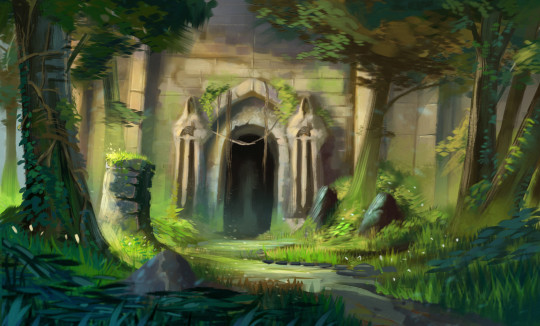
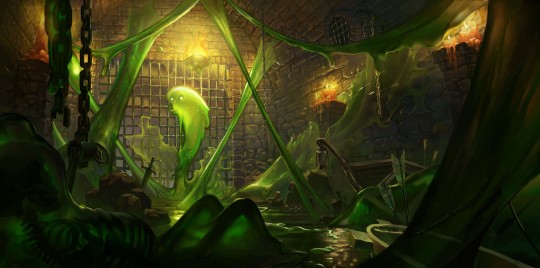
Dungeon: The Seeping Tombs
The learned and pious council of the king's advisors concluded that if sickness was a sign of moral failing, that medicine was a form of ennoblement allowing the sinner to bypass suffering without repentance. By royal decree the healers were thrown in along with their patients, the gates sealed behind them.
Constructed during an age of ignorance, these now innocuous ruins were used as a prison for those who had committed no crime besides falling ill. Pestilence ravaged the land, and after years of failing or outright refusing to control its spread the old king and his pious inner circle began to resent the masses who suffered under under their misrule.
The building that became the tombs was already under construction, intended as the foundations for a great temple dedicated to the king's imperious patron deity. When the work crews grew sick their bodies were passed into the lowest reaches to prevent the spread of miasma, joined soon after by dead from the local villages, and eventually those afflicted but still living.
It was not long after the gates were sealed that something otherworldly come to dwell within the tomb, suborning the natural process of decay causing those interred within to rot into a sickening and malevolent sludge.
Adventure Hook: A new magical malady besets those descended form the king and his pious council, and though some have inherited their forebearers' zeal and callousness many others are quite innocent. When traditional cures fail, The party are hired to seek an answer, and whether through research or the consultation of oracles find themselves pointed towards the seeping tombs. Irony of ironies, this exact sickness was being looked into by talented physician condemned by the king's order, consigned along with her research to a squalid death among those she tried to save.
Whatever the source of the present malady, it has a sense of cruel justice that the party should be wary of.
Challenges & Complications:
Summoned by the prolonged fear, suffering, and affliction of those trapped within the tombs, Juiblex, demon sovereign of ooze, has consecrated the tombs as an altar to despair and wretchedness. The tunnels are overrun with its spawn, along with undead who's spirits cannot rest for all the cruelty that was done to them in life.
The longer and deeper the party explore, the more sick they're likely to get.
Early chambers of this dungeon are a great excuse to use the classic "what looks like a skeletal warrior approaching slowly down a corridor is actually a gelatinous cube & its last meal" encounter, which is a treat in and of itself.
The upper reaches of the tomb are controlled by a nest of ghoulish knights and footmen, who were originally tasked with driving droves of the sick into the dungeon, only to find themselves sealed inside along with the afflicted. As fearful and proud as their departed liege, they play at piety and honour willing to lend aid to the party for a chance to escape the tombs and run rampant on the surface.
The middle reaches of the tomb see the party exploring twisting, sticky corridors, their progress fenced in by portcullises and other defences that need to be opened remotely. These hurdles do not stop the level's guardian, a massive and inexorable ooze that will chase the party with relentless slowness once alerted. Expect an oddly paced chase scene as the party works on opening a path forward while trying not to get trapped in a room by the sludgy green tide.
The cure to the magical malady lays with it's source: the ghost of the masterful physician who's long simmering resentment has manifested as a curse. Having been denied the chance to save her patients, she must be convinced why she should allow her research to be used to save the realm's ungrateful rulers while the victims of their callousness go unmourned. Her counter-offer is as brutal as it is poetic: Let the sickness at the heart of the kingdom devour those who benefit from it, and let the future come as it may.
Art 1
Art 2
#dungeon forest#undead#ooze#juiblex#heironeous#mid level#sickness#plague#disaster#ruin#dungeon crawl
144 notes
·
View notes
Text
LONGING ༉‧₊˚.
synopsis: reader misses zaros on their birthday! a sad fic
The ballroom is alive and thriving with guests, music is blaring and reverberating throughout the hall, rampant sound of laughter and revelry is dancing in the air, the smell of wine and strawberries is thick and inviting
it’s my birthday, but I am cooped up in this absurd corner,next to the fondue table, a glass of switchel in my hand, I would go for a more riveting drink, but I really shouldn’t have alcohol, it’s very easy for me to lose myself if I have too much, and I am determined to not give these people an unwanted show and fuel their zeal for drama and gossip.
I certainly don’t want Zaros to have any reason to laugh or look down on me……even if he isn’t here physically, news travels fast, and if I make a spectacle of myself, there’s no way he wouldn’t hear about it.
My mother, the Queen, gives a long speech in my honour, it’s warm and wholesome, and I certainly don’t deserve to be praised the way she does, she paints me in such a way that I seem tenfold the incredible and dutiful person I am, when that’s far from reality, I dread the day people of my kingdom realise that I’m a fraud, that I hide behind my intelligence and wit, that I haven’t the slightest clue of what I’m doing, this fear, it eats me alive, every single day.
I’m not exactly the best person you’ll ever come across, I know that, and I know if Zaros were here he’d remind of the same every five minutes, even on my birthday
Nobles come and go, bringing in gifts and fake smiles, giving me their half hearted good wishes, all my fair weather friends are here too, this entire ordeal feels more like a desperate attempt to prove who is more loyal and dutiful to the future ruler rather than a birthday party, it all feels so very disingenuous.
No matter how rocky things were between me and Zaros, he had always been a veritable person, one of the very few people who truly saw me for who I was, no matter how unpleasant the “real me” is…
I still remember my 17th birthday, right before everything went wrong, back when he still had some amount of love for me in his soul, he had given me a heart shaped necklace with my initials, in his handwriting, engraved on it, it was custom made for me, he told me that as long as I had that necklace, I would have a piece of him with me at all times
we weren’t always incredibly affectionate with each other,but when we were it was real and almost intoxicating…
I’ve had uncountable pieces of jewellery gifted to me in the past, but none have meant so much to me as that necklace, I have it locked away, safely, my heart still aches every single time I accidentally come across it in my closet
it’s a reminder of how much he really loved and cared for me, and how he’ll never love me the way he used to, ever again, not even if I prayed to the heavens with every single speck of hope and optimism my body can muster…
tears start bubbling in my eyes, “oh god, I don’t want to cry on my birthday, especially not because of him” I think to myself ,I hurry out of the ballroom, leading my way to the balcony before anyone can see me in this state.
I quickly hang on to the railing for support as I feel the sadness seep into my knees making them go weak, I want to breakdown, I want to scream and cry, I want to feel the warmth of his embrace once more, just one more time, it’s the only birthday wish no one in the land can grant me.
A huge pit of longing starts to form in my stomach, as if it’s a black hole ready to engulf my very being right here and now, no matter how hard I try to deny it, I can’t anymore, I miss him so much it hurts, I miss Zaros SO much, he was everything to me, no matter how much we brawled, no matter the poisonous words that spewed out of our mouths when we fought, I still loved him and I know he loved me.
I haven’t seen his face or heard his voice in almost 3 years, my eyes and ears are starved, everything that went down between us, I regret it every day.
A sharp shooting pain stabs me in the chest, as his stupidly charming smile flashes before my eyes, I took it for granted, I still remember the last time he smiled at me like that, teeth and all, warm and comforting, little did I know it’d be the last time I’d ever see it.
Our relationship was always complicated but the one thing that none of us could deny was that we could share anything we wanted with each other, no matter how much he disapproved of my actions, he knew he could be himself around me, he had a way of seeing through my every word, every movement , every look, he knew me better than anyone, even my own mother….even my own self, I had never felt so alive as I did when I was with him, now I feel like an empty shell of a person, existing in vain, bitter and incomplete.
My tired gaze travels outside the balcony, the city looks beautiful, fireworks are ablaze in the sky, I can hear the excitement and chatter of the people outside as they relish the beautiful sight with their loved ones, I haven’t gotten to hear much about Zaros since he left, but I do know that he’s in town, and I know that right now we share the same twilight sky, I don’t care for the expensive clothing, the jewels, the meaningless luxuries that I have received tonight, the only thing I truly want is for him to look up at the sky, and think of me, of every single smile, every thoughtful glance we shared, all the times our laughter echoed through the walls of this palace, and smile, even if it is for a split second. ༉‧₊˚.
63 notes
·
View notes
Text
“…In the Early Middle Ages, most French Jewish communities had settled in the southeast, on the shores of the Mediterranean. Although there were few Jews north of the Alps, they were the focus of restrictive laws that limited their freedom of movement and their ability to interact with Christians.
For instance, a mid-fifth-century council held in Troyes, northern France, prohibited Jews from going out of their houses to have any form of communication with Christians during Eastertide – a time celebrating the death and resurrection of Jesus Christ, therefore a particularly tense period for the Jewish community who were accused of his murder.
A century later, other councils banned the appointment of Jews to any public office that would put them in a position of superiority over a Christian. Jews were no longer allowed to work on Sundays and were to refrain from eating with Christians. Intermarriage between Jews and Christians was forbidden in early Roman law codes, a prohibition early medieval law codes reiterated.
At that time, the fragile state of Christianity – still a relatively new religion in Europe – fueled the clergy’s anxieties. Clergymen were afraid Jewish people would “pollute” the minds of Christians and turn them away from the Church. They advocated relentlessly for their conversion to Christianity. This project was finally successful in the seventh century when the Merovingian king Dagobert called for the baptism or expulsion of the Jews of his kingdom. More than a century of political unrest followed.
Dagobert’s rule, during which Jewish communities grew again in size. By the end of the year 800, Charlemagne became emperor. Charles’ attitude towards the Jews was ambivalent but more open than before. Carolingian capitularies reiterated certain older restrictions, and the chancery levied heavy taxes on the Jews. Because of these taxes, Jews constituted a reliable source of income for the chancery. Charlemagne, therefore, granted the Jewish communities privileges safeguarding their autonomy and their rights to practice their religion.
For instance, Jews responded to their own laws for all matters concerning “low justice,” such as marriage and business contracts, small offences, and inter-community disputes. Murders, however, were to be tried by the Christian authorities. Until the First Crusade, the lives of medieval French Jews were relatively peaceful – only two episodes of violence were reported in the early eleventh century. But things were about to change.
Set in the context of religious zeal, the Crusades stirred the pot of hate. Pope Urban II came to France in 1095 and preached the First Crusade with tremendous success. The message was clear: Christians should take up arms to fight the enemies of God and Christianity. While the pope clearly laid out that the point was to free Jerusalem, some interpreted it differently. According to chronicler Guibert of Nogent (1055–1124), a group of men from Rouen, Normandy, had decided to leave for the East, but they began questioning their purpose:
“We want to attack the enemies of God in the east after traveling great distances, while before our eyes are the Jews, of all races God’s greatest enemy.”
Pondering their options, the men took their weapons, captured many Jews, and killed them, adults and children alike, only sparing those who accepted conversion. Then they left for Jerusalem.
The Crusades fueled dozens and dozens of pogroms across Western Europe. In the late eleventh and early twelfth century, the pressure to convert was immense, and the risks of refusing to convert were even greater. A mid-twelfth-century Christian chronicler, Richard of Poitiers, acknowledged the great sufferings of the Jewish people at the outset of the early crusades, of which he underlined the unfairness. But the anti-Jewish sentiment in the Christian communities only grew stronger.
In the aftermath of the crusades, European Jews were at the center of rumours propelled by distrust and suspicion. In Blois, France, in 1171, Christians accused members of the Jewish community of having murdered Christian children during religious rituals. Called the “blood libel,” these accusations first appeared in England and were attested across Western Europe from the twelfth century to the modern era. In Blois, the blood libel accusations lead to the dramatic death of more than 30 members of the community. The survivors’ estates were confiscated. Ten years later, King Philippe Augustus expelled the Jews from the royal domain.
Anti-Semitism received the Church’s support in the early thirteenth century at the Fourth Lateran Council (1215). The council invited kings and rulers to force the Jews of their kingdoms to wear a distinctive symbol on their clothes or a specific hat that would make them immediately recognizable by Christians. In 1269, Louis IX of France made the symbols mandatory.
The thirteenth century also witnessed the forced segregation of Jews to specific areas. Traditionally, Jews lived together in neighbourhoods often nicknamed juiveries (Jewries). Paris counted four juiveries at that time. When Saint Louis made the distinctive symbols mandatory, he also forced the Jews to live in Jewries. Forced residence in Jewries signalled the birth of “ghettos,” neighbourhoods reserved for the Jewish population of a given town.
In the aftermath of the fourteenth-century plague, many Jewries were equipped with gates locked at night to prevent people from entering or exiting the district. Jewries started to turn into ghettos. The point of the ghettos, some rulers argued, was to protect the Jews from the violence Christians perpetrated against them. But ghettos also functioned as traps and participated in marginalizing the French Jewish communities.
The first decades of the fourteenth century were marked by an economic crisis and recurring food shortages. Anti-Semitism was on the rise again. In 1319 and 1321, Parisians – Christians – manifested their hatred toward Jews by publicly burning the Talmud. The plague signalled a new era of pogroms and violence against the Jews, who became the “scapegoats” of the crisis. The chronicler Jean de Venette witnessed and described the consequences of the plague for the Jews:
Some said that the pestilence was the result of infected air and water… and as a result of this idea, many began suddenly and passionately to accuse the Jews of infecting the wells, fouling the air, and generally being the source of the plague. Everyone rose up against them most cruelly. In Germany and elsewhere – wherever Jews lived – they were massacred and slaughtered by Christian crowds and many thousands were burned indiscriminately.
As Venette states, Christians accused the Jews of having poisoned wells to spread the disease. In Toulon, southern France, 40 Jews were killed by fire right after the epidemic started. In Strasbourg, northeastern France, in 1349, hundreds of Jews who lived in the city’s ghetto were locked up in a building by angry Christians and set on fire. Similar massacres happened in the pontifical city of Avignon, and in Narbonne, Carcassonne, and Toulouse, to cite but a few southern French examples.
Pope Clement VI (1291–1352) issued a bull forbidding the killing of Jews, but to no avail. Distrust and hatred were so intense that the city of Strasbourg, in the Rhine valley, expelled all Jews from its jurisdiction and forbade them from entering the city. This law was only removed from the city’s policies during the French Revolution in the late 1780s.
In many ways, medieval anti-Judaism paved the way for modern anti-Semitism. From accusations of greed and avarice to the blood libel, from the wearing of distinctive symbols to mandatory residence in ghettos, the Middle Ages witnessed the development of a series of stereotypes and a system of repression that had repercussions far into the twentieth century and the modern day.
But the Jewish communities of medieval France did not always live in fear. They enjoyed times of peace and independence and were, usually, relatively integrated into urban communities. Their role in the intellectual renaissance of the twelfth century is especially remarkable and well-marked in historiography.”
- Lucie Laumonier, “Hostility Against the Jews in Medieval France”
279 notes
·
View notes
Text
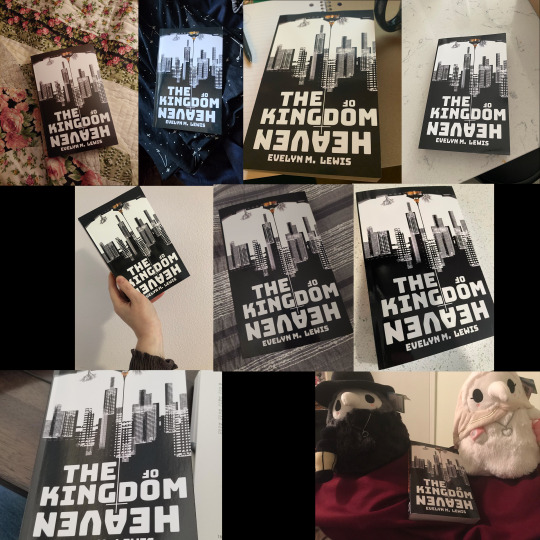
The Kingdom of Heaven has been nominated for a Readers' Choice award from Realm Makers!
From their website:
VOTING FOR FINALISTS: Vote May 21-June 7!
Vote from our list of nominated books (our semifinalists). The five books with the most votes will become Readers’ Choice finalists. Here’s what you need to know:
Anyone can vote.
You can only vote once. Multiple entries will be disqualified. Please don’t try to game the system by using multiple names and email addresses so you can vote more than once. While we appreciate your zeal for your favorite books, if we suspect you’re trying to cheat, those votes will be disqualified.
You can only vote for books you’ve actually read.
Tell us your TOP 5 favorites from the list.
Be thoughtful. The authors deserve that.
Readers, please help me out by voting for KoH!
46 notes
·
View notes
Text
Please vote based on the picture AND the description!
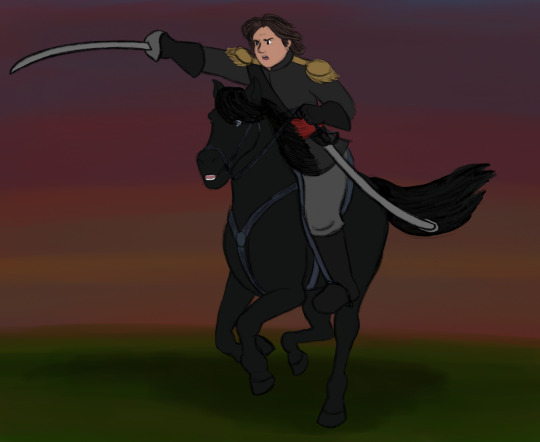
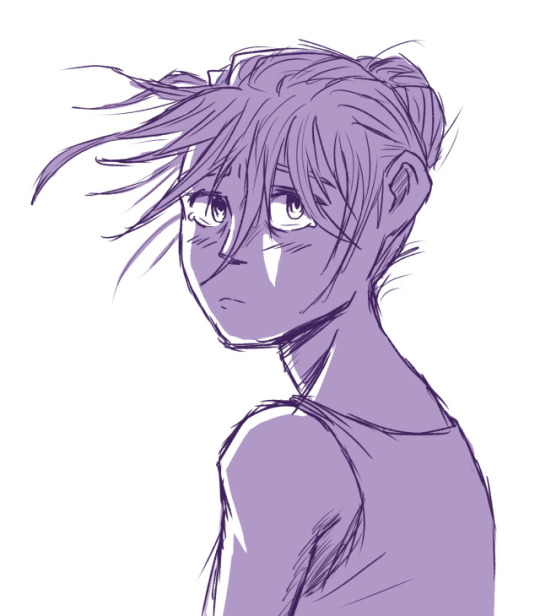
Andre Caron [Swashbucklers of the Magic Kingdom @apieters] - Disney OC
Andre Caron is a swashbuckling young man from the French District of the Magic Kingdom (The Magic Kingdom is basically the world of "The House of Mouse"--all the Disney movies are just that--movies--and the characters have lives outside their movies, although those movies tend to be "fantastic retellings of real-life events" and there is something magical about those Storybooks from the older films...). He is the best friend of the swashbuckling tyrannosaur Chris Carnovo, and together the two of them are the fight choreographers of most of the Disney movies we all know and love ("Peter Pan" was their big break). As a kid, Andre always wanted to be a Knight of the Magic Kingdom, one of the highest honors for valor that could only be won by risking one's life in service of the Royalty of the Magic Kingdom or in the service of a sufficiently large number of people. As an adult, Andre is prone to brooding and melancholy, haunted by his memories of the great civil war known as the Reign of Terror and its leader, Tristan L'Hermite the Black Knight. He is often emotionally cold or short-tempered, prone to biting sarcasm and even fits of rage, yet when the chips are down he will always follow his best friend, Chris Carnovo, off on his galivanting adventures. The two of them complement each others' weaknesses with their strengths. If Chris is impetuous and rash in his zeal to go on an adventure and help his friends, Andre is more strategic and usually has a contingency plan to get his friend and himself out of trouble. Chris, in turn, is Andre's emotional rock, tempering the young man's irritability and sometimes even calling forth the battered remains of Andre's instincts to be a Knight. Andre is ultimately driven by a deep sense of chivalric loyalty to certain people. Chris is one. His childhood friend, Princess Cinderella, is another. The cathedral of Notre Dame and those who dwell within (the Archdeacon and Quasimodo) hold a special place in his heart as a devout Catholic. But perhaps his greatest sense of loyalty is reserved for Queen Sarabi and her family. At the very end of the Reign of Terror, Sarabi--then pregnant with Simba--was about to be killed by Tristan L'Hermite on the steps of the altar of Notre Dame cathedral, when Andre saved her life. The two of them were the only witnesses to the death of Tristan L'Hermite and the end of the Reign of Terror, and on that night Andre swore an oath of loyalty to Queen Sarabi, to her unborn cub Simba, and his lineage. That oath will drive much of his actions in the events of the present day...
Anwedd [Songs of the Fallen @ethanjhake]
A lonely ghost trapped between life and death, she’s been haunting Ryphl, the only person able to see her, since he was discharged from the Children's War.
29 notes
·
View notes
Text
Watch Me Burn
Chapter 1
Summary: Lucien Vanserra, Godkiller and disgraced prince, is more than content on his own. He doesn't need his family, or his wife, or his former friend. Hasn't needed them in years. But when villages start being attacked by a force he thought he'd destroyed years ago, he's forced back into their company to retrieve the mysterious firebird and save his kingdom from ruin.
Pairing: Elucien
Word Count: 3k
Content Warning: Gore, brief mention of infertility
Authors Note: Happiest of holidays to @labellefleur-sauvage! You mentioned you were a fan of the Witcher video games so I wrote this kind of sort of Witcher AU! It was originally a one shot but has ballooned into a 9 part monstrosity, so I hope that's okay, and also sorry about the delay. You were such a lovely match, thank you for putting up with me. Also the biggest thanks to @witch-and-her-witcher for letting me have a meltdown in her dms, and also to @acotargiftexchange for making this happen.
Read on Ao3
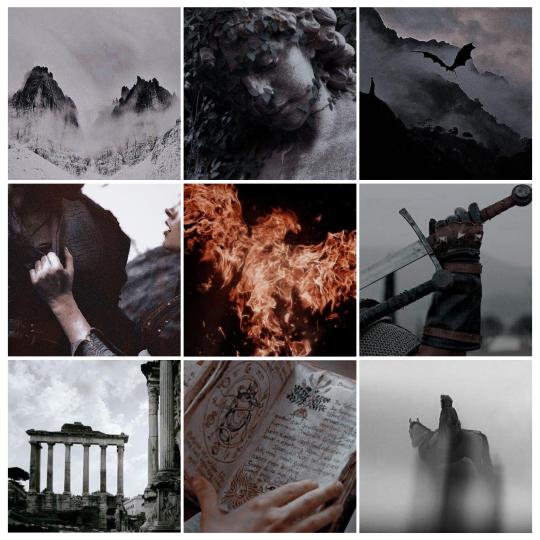
The god sitting in the remains of the temple seemed completely unconcerned with the swarm of bees circling his head. He seemed equally unconcerned by the man approaching him, if his closed eyes were any indication.
Lucien carefully picked his way around the hunks of stone, trying not to twist his ankle as he climbed his way up the half crumbled steps. He scanned for any sort of trick, but aside from the bees there was nothing unusual. Even the god even looked human, if not for the antlers growing out of his head, long and curved like a ram’s.
“You have a choice,” Lucien called once he was on the mostly-level temple floor, unsheathing the sword strapped to his back.
The god didn’t bother to look at him, although Lucien half wondered if he could hear over the sound of buzzing. This close, the swarm was loud enough Lucien’s ear’s were starting to ache.
“Hey,” Lucien yelled, louder this time. A stray bee landed on his nose, and Lucien swiped at it.
Still no response.
Lucien sighed, picked up a piece of marble next to his boot, and threw it at the god. It bounced harmlessly off an antler. That got his attention, and the god swung his head to glare at Lucien with golden eyes.
“The god-butchers really have fallen if they’re resorting to rocks.”
Lucien lifted the sword in his hand, the metal flashing in the sun. “I’ve come to offer a choice.”
“Yes, yes, leave or be killed, I know,” the god signed, sounding bored by the options. “You’re not the first of the butchers to come here and you won’t be the last.”
“You think I’m like most Godkillers?” Lucien asked.
The god looked at him, really looked at him, for the first time, taking in the left eye made of metal, almost the same shade as the god’s own, the long red hair carefully braided back. Recognition danced across his face, at last garnering a response. The god slowly rose to his feet.
Lucien ran through his memory of the remaining gods, the long list of names and descriptions he’d been forced to memorize during his years of training at the keep. He’d spent hours on that list, staying up until the early hours of the morning with nothing but a candle pouring over the pages.
“Hello Aristaeus.”
If it was possible for an immortal being to look surprised, Aristaeus did. “I thought your kind destroyed the old records.”
“The keep has a record for our own usage.” The master, Azriel, insisted it was so the Godkillers would know what they were up against, the monstrous gods they faced. Lucien thought it was bullshit. All the gods who’d proved any real danger had long since been driven out, either killed or sent so deep into the wilderness they’d never be found. Which left Lucien fighting those who were too stupid or weak to leave.
No, Lucien thought they kept the records, made novices memorize every single name on them, because there was something profoundly sad about killing a creature who no one remembered. Who would be wiped completely from existence after they died. And even the Godkillers, for all their zeal and devotion, felt enough pity to do that one act of kindness.
Aristaeus spread his arms widely. “Then you know to fear me.”
Lucien choked down his snort. As if anything he was sent to face made him fear. The minor gods were as dangerous as mosquitos, and twice as irritating.
And they were especially irritating to the villages that paid Lucien to dispatch of them, gathering the little spare change they have left over after market day in a communal cup in the tavern until they had enough saved to pay a Godkiller to get rid of the god who took delight in wrecking their harvest or killed one too many of their herd.
Aristaeus apparently had a propensity for sending bees at all hours of the day, attacking festivals, harvests, or children in the little time they were given to play.
Which unfortunately meant he had to die. So Lucien brandished his sword threateningly and advanced a step.
“I’m going to send your pretty head to your brother,” Aristaeus said. “Remind him of how far the prince can fall.”
Lucien arched an eyebrow, the one that wasn’t cut through with the scar that ran down his face from brow to cheek He’d been described as many things in his life, but pretty was not one he’d heard. Not when the metal eye took so much of people’s focus.
“Eris would probably thank you,” Lucien grumbled.
“Family troubles?” Aristaeus asked, advancing on him, the bees around his head forming a clump. Lucien sensed what was coming a second before, and held up his free hand. Fire flicked at his fingers, smoke trailing from them.
The cloud of bees started to swarm, and Lucien willed the flames higher, the smoke growing thicker. It burned at his eyes and nose, but he kept the flames alight. The bees slowed, circling Lucien but not attacking.
“That’s not fair,” Aristaeus pouted. “Your kind isn’t supposed to have magic.”
“Special allowances were made,” Lucien said, hoisting the sword up and advancing. Understatement of the millennium. “Now yield and leave this place.”
“They used to worship me,” Aristaeus whined. “They would crowd at this temple, pray for their crops to bear fruit, for their fertility.” The bees were fleeing now, trying to escape the heavy smoke still filling the air. “And then they all left me alone, all alone here, and they’re unhappy? The bees are the least of their issues, I should be slaughtering them in their beds.”
“Times change.” Lucien swung the sword, the sharp blade meeting Aristaeus’ neck. The edge that Lucien had so carefully honed that morning sliced through flesh and sinew, severing his head cleanly.
The God didn’t even bleed, just collapsed to the ground before breaking apart into dust. As if he’d never existed at all. Lucien huffed, extinguishing the flames still licking at his fingerprints, and bent down to claim his spoils.
-
The tavern was unusually crowded when Lucien arrived. He was used to a few sad souls, men with nothing better to do than drink the day away, maybe a bar maiden if he was lucky, but today it was teeming. Like the whole town had gathered to see if he’d actually come back.
Lucien lifted the sack he held at his side, dumping its contents on one of the long tables. The head of Aristaeus, the only thing left of the god, tumbled out. The men nearest leapt back, a few retching at the sight.
Lucien snorted. It always surprised him how squeamish farmers could be, seeing what they did to their own animals. Not that presenting heads was his preferred method, but he needed to prove the job was done somehow, and physical evidence was required more often than not.
“I’m owed three talons,” Lucien said, sliding onto the bench in front of the table. “And a cask of ale.”
A mug was placed in front of him, foam nearly flowing over the rim. The deliverer, a man whose hair was more gray than brown slid into the seat across from him. His tunic was slightly finer than those of the rest of the men, his posture straightener. Signs he wore with pride of his town leadership.
Lucien searched his memory trying to find his name. “Grogov,” he said after a second. “I take it you have my coins.”
Grogov’s dark eyes darted around the room, marking a few of the men out. The largest ones. “A few of us were discussing,” he said, “and three talents is a steep price to pay for a day of work.”
“Yet three talons were what you offered, and agreed to.”
Grogov forced out a laugh, the sound strained. “An offer made under duress. Our children were being attacked.”
“They were stung by bees,” Lucien corrected.
“Mothers were hysterical. We felt like we had no other option but to offer something we couldn’t afford to pay.”
“Yet you had the money to print posters,” Lucien said, leaning back in his seat. His hand, the one not wrapped around the handle of the beer mug he had yet to drink from, drifted down to his waist band, and the knife tucked there. “And enough coins to show me when I arrived.”
“Circumstances change,” Grogov said. The men he’d given such significant glances to seemed to advance, forming a loose ring around them. “And I’m sure we could come to an arrangement.”
Lucien’s fingers wrapped around the knife hilt. “An arrangement where you pay me three talents?”
Another strangled laugh from Grogov. “You drive a hard bargain.”
“One where I’m paid what I’m owed?”
Grogov leaned closer. “There’s always room for debate.” Behind him, one of the men, no doubt the largest in the village, pulled out a sword. The blade was dull, rusted in parts, and Lucien had to keep from snorting at the lack of threat it posed.
“Threatening a Godkiller then?”
“Merely opening the conversation. After all, you’re alone. No companions, no family.”
Lucien hummed, understanding the threat in the words. No one would notice if you were missing, not for a long while anyway. He made a show of debating the idea, furrowing his brow, before leaping out of his seat with speed no human man could hope to match. He threw Grogov against the wall of the tavern, sliding the small knife out of his pocket and holding it against the man’s throat.
“Talk away.”
Grogov swallowed, the movement of his throat pressing the blade into his skin. Blood welled, and his eyes slid to the head still on the table. The village lads, picked for their size, not their bravery, seemed frozen in place.
“I—”
He was saved from talking himself into further danger by the tavern door flying open. Trumpets sounded, the ridiculous jaunt of the Lord of Kouemos. A song far too chipper for a ruler who was, by all accounts, a terror.
Lucien didn’t drop the blade, but did turn his head towards the sound. The messenger lowered the trumpet, looking entirely too pleased with himself. The colors of his costume, the bright red and yellow stripes, were comically amidst the dirt and grime of the tavern. As were the shoulder pads that ballooned around his upper arms, and the tight, short breeches.
Musicians, Lucien thought to himself.
“I have a message for Lucien Vanserra.”
“Present,” Lucien growled, not moving. He watched the tavern still as they stared at him, tried to square the rough Godkiller threatening the town’s reeve with the stories they’d no doubt heard. Of the gentle noble, his mother’s favorite for his kind heart, so different than that of his brothers.
“I hail from Kousemos,” he said, with a flourishing bow. Lucien tried not to roll his eyes. As if anyone would be able to miss that, based on his, well, everything. A bunch of ostentatious self righteous pricks they were. “You’ve been summoned by our fearless, magnanimous, kind—”
“Get one with it,” Lucien interrupted.
The messenger cleared his throat. “Our leader requests your presence.”
“Will he pay?”
“Most assuredly, anything you may ask for. Our leader is well known for being generous, the most generous—”
“Yes fine,” Lucien sighed. He pressed Grogov closer to the wall. “Just as soon as this one pays up.”
Grogov reached a trembling hand into his pocket, pulling out the three gold coins Lucien was after. Apparently matters were much less up for debate now. Lucien snatched the coins, before lowering the knife. He cast a mournful glance at his ale, still untouched and gestured for the messenger to lead the way out of the tavern.
Shockingly, his horse was still where he’d left it, tied to the post in front of the stable. “Sorry for the delay, Tam,” Lucien said, stroking his roan mane once before pulling himself up into the saddle.
“My lord,” the messenger said, running after him. The shoulder pads flapped dramatically up and down, and Lucien bit down on his tongue to hold in his laughter. “I insist upon accompanying you.”
“It’s Lucien.” He hadn’t been called Lord in a long, long time. “And you’ll just slow me down.”
“I insist,” the messenger said. “My orders demand it.”
Lucien nodded. “And what’s your name?”
“Hart, sir.” He gave another little bow of flourish.
“Hart, who gave you this order?”
“The reeve of Kousemos,” he said proudly.
Lucien smiled, one of the slow, sarcastic ones he’d all but mastered. “Then I, Lord Lucien, outrank him, yes.”
Hart blinked. “Well, I—”
“So I order that I ride alone.” And with that, Lucien nudged Tamlin on, the horse starting off at a brisk trot, leaving Hart standing in front of the stable, a bright spot against the dusty ground.
-
Kouemos had changed since he’d last come. Sure, the buildings were the same, small shacks lining the one street leading up to the large manor house. But it was like the air was different, hung thick with the raw, almost bitter, taste of power. The town seemed to hum, getting fuzzy around the edges. The colors were too bright, the green of the plants a brilliant emerald that he’d only seen on the tapestries his mother liked to sew with her ladies.
Lucien shifted uneasily in the saddle. Even Tamlin seemed uncomfortable, his ears held back, muscles tensed.
“It’s fine,” Lucien said, not sure if he was talking to himself or the horse. His voice seemed to echo, the world far too quiet. Tam’s hooves drummed against the cobblestones in the silence, alerting anyone who was waiting for them. Here we are. Lucien peered at the small houses, expecting to see dirty faces pressed against the windows, but there were none.
In fact, there were no people anywhere, not in the streets, not manning the few carts that dotted the side of the road. They looked haphazard in their placement, as if the owner had just dumped them wherever he stood and walked away.
The magic in the air only seemed to grow stronger as he got closer to the manor house, the colors around him brighter. Flowers bloomed from window boxes, overflowing their containers and spilling onto the ground. The hue almost burned at his eye, too bright for any human to take in.
The gates to the house were left wide open and unguarded, inviting anyone who wanted to to enter. Lucien swung himself off Tamlin’s back. A trap, certainly, but one he was too curious not to enter. “Stay here,” he told the horse. Tamlin shuffled his hooves uncomfortably.
Lucien pulled out one of the twin blades he’d strapped on his back, brandishing it high as he walked through the entrance.
If Lucien thought the town had been bright, it was nothing compared to inside the gates. Vines crawled over the ground, blossoms peeking through anywhere they could get sunlight, crowding against one another. Fruit hung from branches, apples in the same bunches as oranges, pressed next to plums.
Lucien plucked one, biting into it. Juice gushed down his chin, too much to be contained in any normal fruit. He spat it out quickly, throwing the plum away from him. Where it hit the ground, it instantly started sprouting, green pushing through the pit and reaching up towards the sky.
He shoved through the vines, trying to wade towards the house’s entrance. He slashed at the growth, but it seemed to grow back faster than he could beat it back.
By the time he made it to the entrance he was dripping in sweat, thick rivulets streaming down his forehead. His tunic stuck to his skin, the white linen practically see through it was so damp.
Lucien pounded on the door with his fist, and it flew open.
“Greetings, Lord Lucien,” the man said brightly, utterly unfazed by Lucien’s dishevelment. Or the sharp blades in his hands. He wore the same garish costume as the messenger, the colors making his features look washed out, plain. “The town reeve is waiting for you.”
“I heard.”
“Good, good,” the man said, stepping back. His eyes were unfocused, looking through Lucien. “I’ll take you right there.” He turned mechanically, leading Lucien through the halls. His motions were jerky, slow, like he wasn’t in control of his own body.
The rest of the house seemed to be in a similar daze. Lucien cocked his head as a maid carrying a bucket full of flowers almost slammed into him. Like she didn’t even notice he was there. Her dress was far too nice for her station, a tick velvet brocade that would be more fitting among a lady’s ball gowns. And far nicer than anything anyone in Kouemos had ever owned.
Lucien followed the man through the lower floor and up a side staircase, although he had a sinking suspicion he knew exactly where they were going. Sure enough, they came to a stop in the middle of a long hallway, facing the middle of three doors in it.
“The reeve will be so excited to see you.”
Lucien smiled wryly. “Of that I’m sure.”
The door flew open without either of them touching it, opening up to a darkly lit chamber. Lucien strode in, a rough smile still on his face.
The room was utterly barren except for a single bed in the middle of the room, and the woman lounging on it.
She was stunning, gold hair floating around her shoulders in soft curls. Same soft pink dresses she always seemed to wear, same heart shaped face peering up at him. Lucien wracked his brain trying to remember the last time he’d seen her. Two years ago? Three? Big brown eyes met his, and Lucien saw the amusement flickering in their depths, as if she knew exactly what he was thinking.
“Godkiller,” she said, the single word somehow managing to sound melodic on her tongue.
“Hello wife.”
#acotar secret santa 2023#elucien#acotar#elucien fanfiction#acotar fanfiction#elain archeron#lucien vanserra#elain x lucien#now to go catch up on everyone elses fic
58 notes
·
View notes
Text
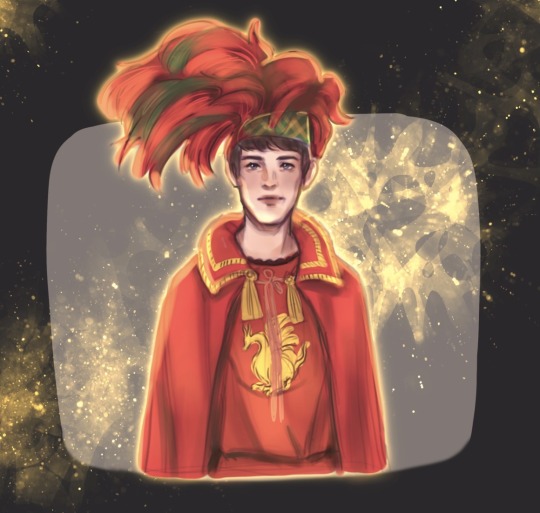
♡📕🖍˚ ༘ *🍓
I sketched my boy in red, I sit admiring and thinking about the zeal and scrupulousness with which Arthur approached the design of this beautiful hat
No one except Merlin in this series has ever worn such a suit, with such a pronounced embroidered coat of arms of Camelot. Servants were probably not allowed to wear the symbols of the kingdom, only knighthood and nobility had this honor. However, Merlin is a royal husband without five minutes, so he can
#merlin art#Merlin fanart#Merlin#Merlin bbc#bbc Merlin#merlin emrys#Merlin in red#fanart#art#digital painting#artists on tumblr#painting#scetch#artwork#wip#art on tumblr#study#digital art#young artist
284 notes
·
View notes